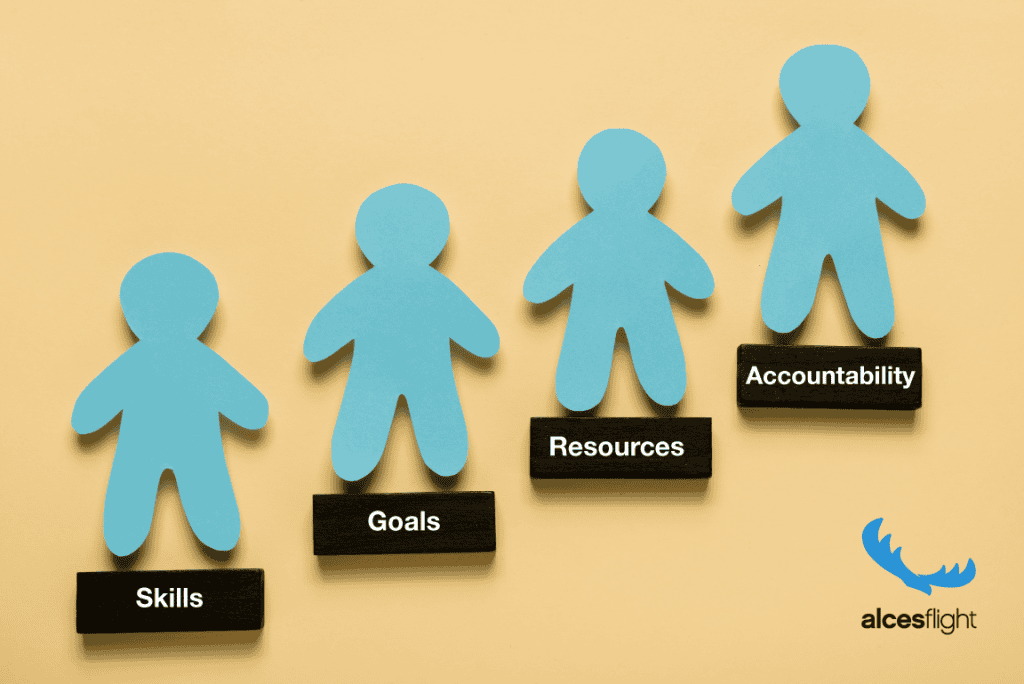Lesson Three: Skills Development – Goals, Accountability and Resources
A quick glance at today’s news often highlights the challenges surrounding hiring and training the next generation of technical leaders. While there’s no shortage of discussions about where blame lies, meaningful change is possible through small, positive steps.
Alces Flight Crew Member, Cristin Merritt, took a unique approach to her session by moving away from panel discussion and focusing on facilitating goal-setting strategies. Drawing inspiration from the 2024 Move the Needle Project, her session encouraged participants to think about how both individual and group contributions can help develop stronger skill sets and teams across all sizes of organisations.
Think Small
Setting goals is essential, but they should be realistic and measurable to ensure long-term success. Cristin emphasised the following key points:
- Start with manageable steps. Aspirational goals are great, but they should be broken down into smaller, achievable milestones that can be tracked and built upon over time.
- Be open to non-linear progress. Goals often evolve in unexpected ways, so it’s important to conduct regular reviews and remain flexible. New pathways can lead to positive outcomes.
- Understand the motivation behind your goals. Differentiating between needs and wants—particularly in areas like staff training—is critical for achieving meaningful and lasting success.
“The team at Alces Flight actively engages in goal-setting conversations with clients and the community. Understanding the nuances that drive progression and change is vital for delivering solutions that empower institutions and individuals alike. Facilitation sessions like this are one way we give back to the communities that support our work.”
– Cristin Merritt
Build Support
Achieving your goals requires more than just setting them. You need the right support, accountability, and resources in place. Consider the following steps:
- Secure leadership buy-in. Engaging with leadership on your goals can uncover resources you might not realize are available, from additional funding to dedicated time and support.
- Establish accountability mechanisms. Whether it’s regular check-ins, digital tools, or progress reports, accountability ensures you stay on track and motivated to reach your goals.
- Identify necessary resources. Resources aren’t always about time and budget. They can also include collaboration with others, access to specific tools, or even physical materials that help bring your goals to life.
Investing time in developing realistic goals and building the framework to achieve them is vital for success—whether you’re focused on hiring, training, or tackling your next big technical project. Initiatives like the Move the Needle Project and the UK DRI Retreats provide valuable opportunities to reflect, strategize, and create actionable plans for positive outcomes.
By starting small, securing the right support, and staying accountable, you can ensure that your goals drive meaningful progress—not just for yourself, but for your entire organisation.
If you enjoyed this post on lessons learned from the UK DRI Retreat check out our lessons taken from Developing Industry Relationships and Short and Long-Term Actions for Sustainability.
The UK DRI Retreat, held from January 13–17, 2025, in Manchester, was designed with a specific focus on developing the soft skills of technical research professionals. The event also provided valuable networking opportunities, with an aim to create connections across various institutions and communities. We are grateful for the invitation to take part in this event and share our insights, as well as gain invaluable opportunities to connect to the current needs from our community.


